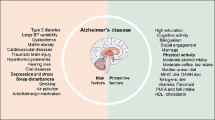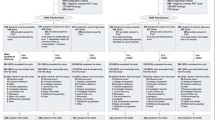Abstract
Objectives
Senescence of the immune system and of endothelial cells can contribute to age-dependent vascular and neurodegenerative disorders including Alzheimer’s disease. The aim of this study is an assessment of putative relationships of serum levels of transforming growth factor beta (TGFβ) and soluble endoglin (sCD105) and neurodegeneration, and of changes of these molecules in the course of ageing.
Design
The subjects of the study consisted of three groups, the first one was 63 otherwise healthy middle-aged participants, 31 females, 32 males, of average age 35 years. The second group was formed by 58 healthy, self-dependent inhabitants of nursing homes, 44 females and 14 males, average age 83.5 years. The third group comprised of 129 Alzheimer’s disease patients, 86 females, 43 males, of average age 80 years, with MMSE score that ranged from 16 to 20.
Measurement
Serum levels of TGF beta and soluble endoglin were measured by the ELISA method in samples of peripheral blood using commercial kits.
Results
The serum level of TGFβ was 34,339 ± 6,420 pg/ml in the healthy younger group, 37,555 ± 11,944 pg/ml in the healthy seniors, and 29,057 ± 11,455 pg/ml in Alzheimer’s disease patients. Compared to healthy seniors, the serum level of TGFβ was significantly decreased in Alzheimer’s disease patients (p<0.01). The serum level of endoglin were 4.88 ± 0.95 μg/ml in the healthy younger group; 6.11 ± 1.38 μg/ml in healthy seniors, and 7.20 ± 1.72 μg/ml in patients with Alzheimer’s disease, respectively. The serum level of endoglin was significantly higher (p<0.001) in senescent healthy persons compared to the younger control group. When compared with healthy seniors, patients with Alzheimer’s disease had significantly elevated (p<0.001) serum level of endoglin.
Conclusions
Decreased levels of TGFβ in Alzheimer’s disease may result in impairment of cerebral circulation reflected in the increased endoglin levels. These findings may indicate involvement of the immune system in Alzheimer’s disease pathogenesis.
Similar content being viewed by others
References
Kim IY, Kim MM, Kim SJ. Transforming growth factor-beta: biology and clinical relevance. J Biochem Mol Biol. 2004; 38: 1–8.
Le Y, Yu X, Ruan L, Wang O, Qi D, Zhu J, Lu X, Kong Y, Cai K, Pang S, Shi X, Wang JM. The immunopharmacological properties of transforming growth factor beta. Int Immunopharmacol. 2005; 5: 1771–1782.
Bobik A. Transforming growth factor-betas and vascular disorders. Arterioscler Thromb Vasc Biol. 2006; 26: 1712–1720.
van Laake LW, van den Driesche S, Post S, Feijen E, Jansen MA, Driessens MH, Mager JJ, Snijder RJ et al. Endoglin has a crucial role in blood cell-mediated vascular repair. Circulation 2006; 114: 2288–2297.
Li CH, Hampson IN, Hampson L, Kumar P, Bernabeu C, Kumar S. CD105 antagonizes the inhibitory signaling of transforming growth factor beta1 on human vascular endothelial cells. FASEB J. 1999; 14: 55–64.
Bernabeu C, Conley BA, Vary CPH. Novel biochemical pathways of endoglin in vascular cell physiology. J Cell Biochem. 2007; 102: 1375–1388.
Wipff J, Avouac J, Borderie D et al. Disturbed angiogenesis in systemic sclerosis: high levels of soluble endoglin. Rheumatology 2008; 47: 972–975.
Akiyama H, Barger S, Barnum S et al. Inflammation and Alzheimer’s disease: Neurobiol Aging 2000; 21: 383–421.
Feisten A, O’Connor P, Gray T, Einstein K. Pathological laughing and crying in multiple sclerosis: a preliminary report suggesting a role for the prefrontal cortex. Mult Scler. 1999; 5: 69–73.
Tesseur I, Wyss-Coray T. A Role for TGF-beta Signaling in Neurodegeneration: Evidence from Genetically Engineered Models. Curr Alzheimer Res 2006; 3: 505–513.
Vivien D, Ali C. Transforming growth factor beta signalling in brain disorders. Cytokine Growth Factor Rev. 2006; 17:121–128.
Wyss-Coray T, Lin C, Sanan DA, Mucke L, Masliah E. Chronic Overproduction of Transforming Growth Factor-beta 1 by Astrocytes Promotes Alzheimer’s Disease-Like Microvascular Degeneration in Transgenic Mice. Am J Pathol. 2000; 156: 139–150.
Wipff J, Avouac J, Borderie D, Zerkak D, Lemerechal H, Kahan A, Boileau C, Allanore Y. Disturbed angiogenesis in systemic sclerosis: high levels of soluble endoglin. Rheumatology.2008 (Epub ahead of print)
Ijke P, Goumans MJ, Pardali E.Endoglin in angiogenesis and vascular diseases. Angiogenesis. 2008; 11: 79–89.
Takahshi N, Kawanishi-Tebata R, Haba A, Tabata M, Haruta Y, Tsai H, Seon BK. Association of serum endoglin with metastasis in patients with colorectal, breast, and other solid tumors, and suppresive effect of chemotherapy on the serum endoglin Clin Cancer Res 2001; 7: 524–532.
Xu B, Wu YQ, Huey M. Vascular Endothelial Growth Factor Induces Abnormal Microvasculature in the Endoglin Heterozygous Mouse Brain. J Cereb Blood Flow Metab. 2004; 24: 237–244.
Ilzecka J. Decreased serum endoglin level in patients with amyotrophic lateral sclerosis: a preliminary report. Scand J Clin Lab Invest. 2008; 68: 348–351.
Dziewulska D, Rafalowska J. Role of endoglin and transforming growth factor-beta in progressive white matter damage after an ischemic stroke. Neuropathology 2006; 26: 298–306.
Author information
Authors and Affiliations
Corresponding author
Rights and permissions
About this article
Cite this article
Juraskova, B., Andrys, C., Holmerova, I. et al. Transforming growth factor beta and soluble endoglin in the healthy senior and in Alzheimer’s disease patients. J Nutr Health Aging 14, 758–761 (2010). https://doi.org/10.1007/s12603-010-0325-1
Received:
Accepted:
Published:
Issue Date:
DOI: https://doi.org/10.1007/s12603-010-0325-1




